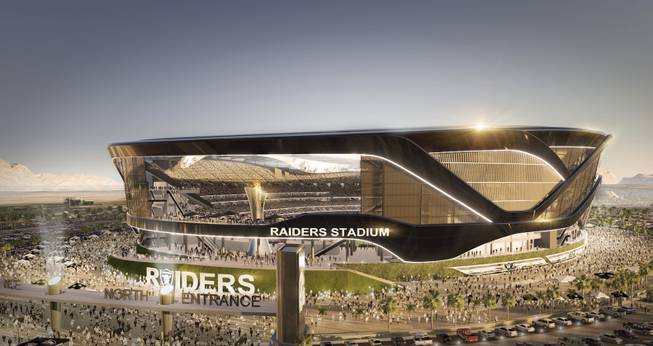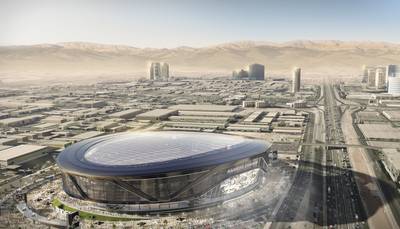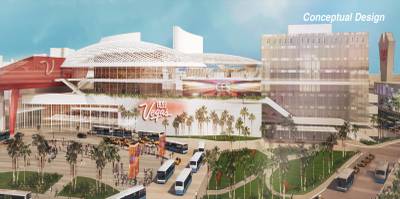
Courtesy of MANICA Architechture
An artist’s illustration of a stadium on Russell Road and Las Vegas Boulevard was revealed during a Southern Nevada Tourism Infrastructure Committee meeting at UNLV Thursday, Aug. 25, 2016.
Tuesday, Sept. 6, 2016 | 2 a.m.
It’s that time of year again: The only thing standing between Nevada and what many would see as an economic-development win is a legislative deal worth hundreds of millions of dollars.
In 2014, it was Tesla. In 2015, Faraday. This year, an NFL stadium.
Nevada’s Legislature only meets for a few months every two years, so it's expected that a special session needs to be called before the end of 2016 to approve a public-funding deal for the stadium project, put forward by Las Vegas Sands, Majestic Realty and the Oakland Raiders earlier this year. The governor can call one by proclamation, or the Legislature can call itself into session through a petition signed by two-thirds of its members.
Funding needs to be pinned down before stadium backers — including billionaire Sheldon Adelson, Sands’ chairman and CEO — approach NFL owners in January officially about moving the Raiders to Las Vegas.
Developers want the public to contribute $750 million, generated by increasing the existing tax on hotel rooms. The football team's owner, Mark Davis, plans to contribute $500 million, while Adelson has personally pledged $650 million toward the $1.9 billion endeavor.
Pressure mounted after a recent meeting of the Southern Nevada Tourism Infrastructure Committee, where Sands executives said the state must contribute $750 million to the stadium or they would back out of the project. Emphasizing that they needed time to craft their pitch to NFL owners (from whom they need three-quarters support to relocate the team), they added that a special session should be called by the end of September.
Sands executives have said they've been in touch with lawmakers daily — sometimes two or three times a day — in an effort to woo their approval of that timeline. But recent interviews with a dozen state legislators revealed some concerns over rushing into a special session this month — both in terms of vetting the stadium deal and the ripple effects of having a session right before the election.
Legislators worried about taking valuable time away from the incumbents running for re-election, and the impact the mandatory 15-day “blackout” period on fundraising following a special session would have on campaigns.
• • •
For the most part, Republican legislators said they hope a special session is called as soon as recommendations for a deal are given by the Southern Nevada Tourism Infrastructure Committee, though they noted that a September or October session could burden incumbents seeking re-election. Significant fundraising dollars will likely roll in over the next several weeks as candidates begin proving their mettle in polls against their opponents.
“If we can iron out the details and it makes sense, obviously we’d like to see it happen. But also, anytime you rush something you miss stuff,” said Republican Sen. Patricia Farley, who isn’t up for re-election. “Unfortunately, the business world, they don’t wait around for election cycles. I can certainly see why some people would want to wait.”
Republican Assembly Majority Leader Paul Anderson said that until the details of the deal are ironed out, it’s difficult to talk about dates.
“As soon as we’re at that point, we’ll commit and get it done quickly,” Anderson said. “But until that point — leaving the election cycle out of the picture — it doesn’t even make sense to talk about dates because we’re simply not there.”
Republican Gov. Brian Sandoval isn’t ready to call a session yet, either.
“The Governor has said he will not make any decisions regarding a special session until the committee has delivered its final recommendations,” spokeswoman Mari St. Martin said in a statement.
The tourism committee was originally scheduled to meet next week, but an additional meeting has been called for Thursday to continue chewing on the stadium proposal.
There’s also concern about the impact voting for the stadium could have on the outcome of the election itself. Republican Assemblyman Ira Hansen, who is running unopposed in his race in Northern Nevada, pointed to a recent KTNV/Rasmussen Poll that showed 55 percent of Clark County voters oppose pledging up to $500 million in public funds to the stadium.
“The polls I’ve seen in Southern Nevada are about 50-50,” Hansen said. “Politically, this could hurt somebody running for re-election.”
Democrats, meanwhile, largely prefer having the special session after the election as they pour their efforts into winning back control of the Legislature.
Democratic Sen. Pat Spearman, who is up for re-election in a relatively safe district, said the fundraising issue would “certainly impact me, but I’m more concerned that we not get sidetracked on the issues we’re already dealing with in this election cycle. We are working hard to regain the majority.
Then there’s the issue of vacancies — three in the Assembly and two in the Senate. The appointment process, which happens through the county commission, typically takes a couple of weeks, and newcomer legislators could tip the balance on a vote in either house.
• • •
The biggest issue is that the specifics of a deal, which will come in the form of a recommendation by the tourism committee, have yet to be ironed out. As three legislators said: “The devil is in the details.”
Republican Sen. Becky Harris said that, from people she’s spoken with, the public is generally supportive of the stadium idea. “But you have to look at what the impact is for the public, what events we’ll be able to qualify to have here, and the overall economic impact,” Harris said.
Democratic Assemblyman Nelson Araujo said he hoped discussions about the stadium would be inclusive of the community and its concerns.
Others, like Farley and Democratic Sen. Tick Segerblom, raised concerns about the state pumping so much money into the stadium project when other government services like mental health or education could use additional funding.
“My big question is, how do we take public money and make sure that we’re addressing those critical needs as well?” Farley said. “To me, those needs are more important.”
Segerblom said the state’s priorities seem backwards.
“Why is it that every time we want to give money away to Tesla or Faraday or the stadium, we call a special session and rush up there and do it?” Segerblom said. “But money for schools? We have to go through the legislative process and beg for everything.”
The response to that from stadium proponents has been that the room tax was created to support tourism in Las Vegas, and that education is an important but separate issue.
Anderson said that putting room-tax money toward the stadium would be using it for what it was intended — ”putting heads in beds” — and that it could boost tourism in Las Vegas. (Instead of directly raising the tax to fund education, the idea is that the stadium would increase economic activity, resulting in more taxes being collected, some of which would go to education.)
Some legislators said they would be in favor of voting on an already-approved recommendation from the tourism committee to also raise the room tax to fund an expansion and renovation of the Las Vegas Convention Center alongside the stadium deal. Others said they wouldn’t vote for the stadium unless the convention center was included.
• • •
Legislators mostly described it as a game of wait-and-see, not wanting to take a position until the deal is finalized. Democratic Assemblywoman Maggie Carlton, however, was outspoken about her opposition.
“From where I personally am, I’m opposed to it,” Carlton said. “Public stadiums — I’ve not found anything in doing a little research that gives me any level of comfort yet.”
She said she considers herself in the same camp as County Commissioner Chris Giunchigliani, who has been very vocal in her belief that a stadium should be built with private dollars alone.
That’s been one of the biggest arguments against the stadium — that the public shouldn't be involved and that the developers should secure funding from private sources, particularly in light of Adelson’s wealth. Some have framed the public contributing money to the stadium project as tantamount to subsidizing a billionaire.
But some legislators pushed back on that idea.
“The one piece that falls out is somehow that we’re subsidizing billionaires. That is simply not the case — It goes the other way,” Anderson said. “We are using private dollars to build a public stadium, and we’re only on the hook for a third of it.”
The details are still in flux, but the current proposal suggests that the public would own the stadium but that investors would be entitled to some profits from its operation.
“There should be a return on investment for everybody involved,” Anderson said. “Whether that would be split over a certain timeframe, I don’t have an answer.”
Once a deal is secured, the obvious goal is to get as many legislators on board as possible. A two-thirds vote in both houses would be needed to raise the room tax, so 42 legislators need to be on board.
If that doesn’t happen, Plan B is to punt the decision to the Clark County Commission. Legislators could pursue a permissive vote, which would only need a simple majority, and pass the tax-increase vote along to the seven-member county commission, which would need to pass it with a two-thirds majority.
But most lawmakers thought the Legislature would move quickly once a consensus is reached.
Hansen went so far as to call it a “done deal” because of the people involved.
“The guy who owns the biggest newspaper in the state, an extremely wealthy guy who is well-known in the political world? Of course,” Hansen said. “It’s not like you and I are out there proposing it — these are people who are major power players in the state of Nevada.”



Join the Discussion:
Check this out for a full explanation of our conversion to the LiveFyre commenting system and instructions on how to sign up for an account.
Full comments policy